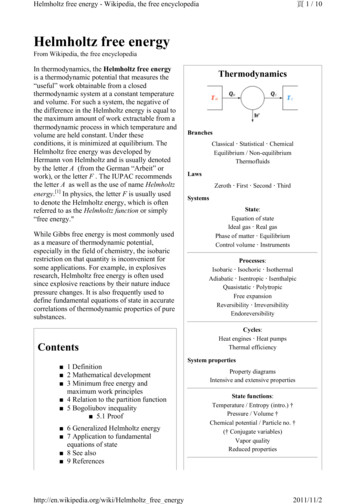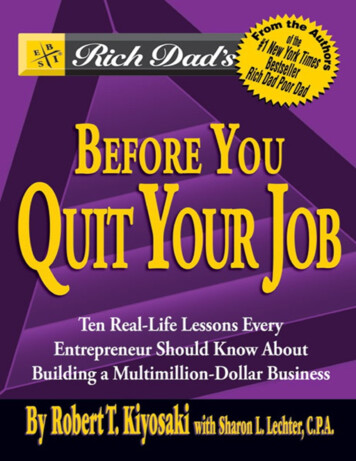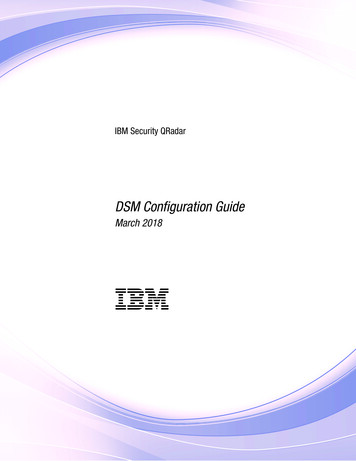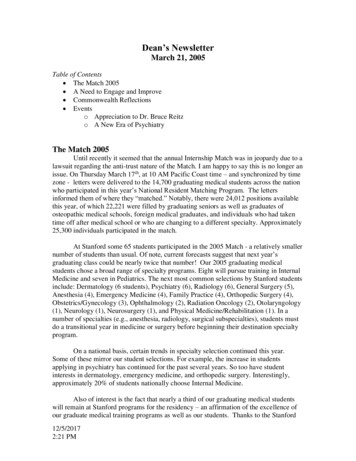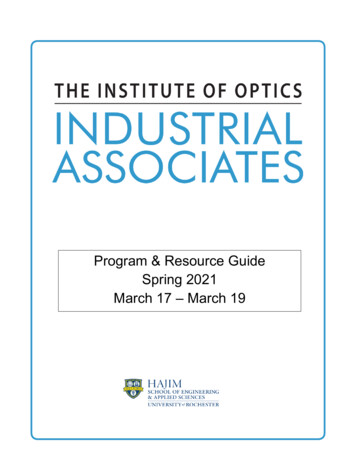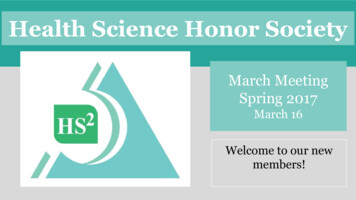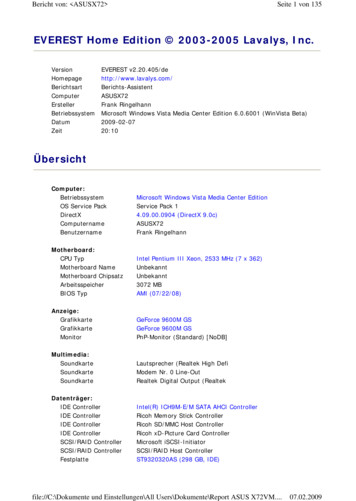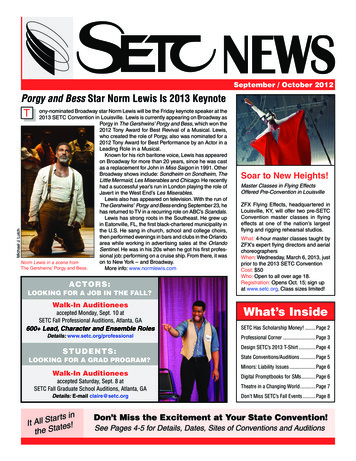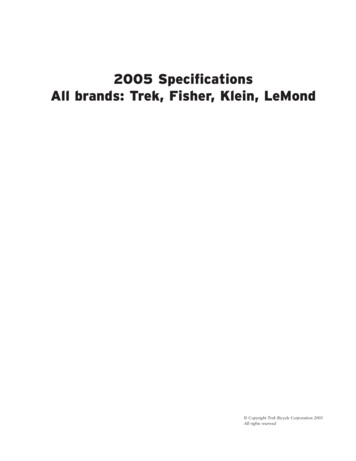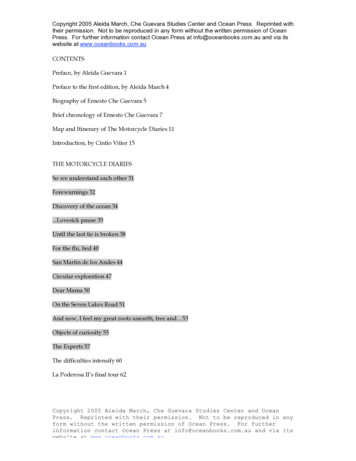
Transcription
Copyright 2005 Aleida March, Che Guevara Studies Center and Ocean Press. Reprinted withtheir permission. Not to be reproduced in any form without the written permission of OceanPress. For further information contact Ocean Press at info@oceanbooks.com.au and via itswebsite at www.oceanbooks.com.auCONTENTSPreface, by Aleida Guevara 1Preface to the first edition, by Aleida March 4Biography of Ernesto Che Guevara 5Brief chronology of Ernesto Che Guevara 7Map and Itinerary of The Motorcycle Diaries 11Introduction, by Cintio Vitier 15THE MOTORCYCLE DIARIESSo we understand each other 31Forewarnings 32Discovery of the ocean 34.Lovesick pause 35Until the last tie is broken 38For the flu, bed 40San Martín de los Andes 44Circular exploration 47Dear Mama 50On the Seven Lakes Road 51And now, I feel my great roots unearth, free and. 53Objects of curiosity 55The Experts 57The difficulties intensify 60La Poderosa II’s final tour 62Copyright 2005 Aleida March, Che Guevara Studies Center and OceanPress. Reprinted with their permission. Not to be reproduced in anyform without the written permission of Ocean Press. For furtherinformation contact Ocean Press at info@oceanbooks.com.au and via itswebsite at www.oceanbooks.com.au
Copyright 2005 Aleida March, Che Guevara Studies Center and Ocean Press. Reprinted withtheir permission. Not to be reproduced in any form without the written permission of OceanPress. For further information contact Ocean Press at info@oceanbooks.com.au and via itswebsite at www.oceanbooks.com.auFirefighters, workers and other matters 64La Gioconda’s smile 67Stowaways 73This time, disaster 76Chuquicamata 79Arid land for miles and miles 82The end of Chile 84 Chile, a vision from afar 86Tarata, the new world 89In the dominions of Pachamama 94Lake of the sun 98Toward the navel of the world 100The navel 103 The land of the Incas 105Our Lord of the Earthquakes 111Homeland for the victor 113Cuzco straight 115 Huambo 118Ever northward 123Through the center of Peru 126Shattered hopes 129The city of the viceroys 133Down the Ucayali 140Dear Papi 145The San Pablo leper colony 146Saint Guevara’s day 148Debut for the little Kontiki 152Copyright 2005 Aleida March, Che Guevara Studies Center and OceanPress. Reprinted with their permission. Not to be reproduced in anyform without the written permission of Ocean Press. For furtherinformation contact Ocean Press at info@oceanbooks.com.au and via itswebsite at www.oceanbooks.com.au
Copyright 2005 Aleida March, Che Guevara Studies Center and Ocean Press. Reprinted withtheir permission. Not to be reproduced in any form without the written permission of OceanPress. For further information contact Ocean Press at info@oceanbooks.com.au and via itswebsite at www.oceanbooks.com.auDear Mama 153On the road to Caracas 158This strange 20th century 160A note in the margin 163Appendix: A child of my environment(Speech to medical students, 1960) 167Copyright 2005 Aleida March, Che Guevara Studies Center and OceanPress. Reprinted with their permission. Not to be reproduced in anyform without the written permission of Ocean Press. For furtherinformation contact Ocean Press at info@oceanbooks.com.au and via itswebsite at www.oceanbooks.com.au
Copyright 2005 Aleida March, Che Guevara Studies Center and Ocean Press. Reprinted withtheir permission. Not to be reproduced in any form without the written permission of OceanPress. For further information contact Ocean Press at info@oceanbooks.com.au and via itswebsite at www.oceanbooks.com.auENTENDÁMONOSso we understand each otherThis is not a story of heroic feats, or merely the narrative of a cynic;at least I do not mean it to be. It is a glimpse of two lives runningparallel for a time, with similar hopes and convergent dreams.In nine months of a man’s life he can think a lot of things, fromthe loftiest meditations on philosophy to the most desperate longingfor a bowl of soup — in total accord with the state of his stomach.And if, at the same time, he’s somewhat of an adventurer, he mightlive through episodes of interest to other people and his haphazardrecord might read something like these notes.And so, the coin was thrown in the air, turning many times,landing sometimes heads and other times tails. Man, the measureof all things, speaks here through my mouth and narrates in myown language that which my eyes have seen. It is likely that out of10 possible heads I have seen only one true tail, or vice versa. Infact it’s probable, and there are no excuses, for these lips can onlydescribe what these eyes actually see. Is it that our whole visionwas never quite complete, that it was too transient or not alwayswell-informed? Were we too uncompromising in our judgments?Okay, but this is how the typewriter interpreted those fleeting impulsesraising my fingers to the keys, and those impulses have nowdied. Moreover, no one can be held responsible for them.The person who wrote these notes passed away the moment hisfeet touched Argentine soil again. The person who reorganizes andpolishes them, me, is no longer, at least I am not the person I oncewas. All this wandering around “Our America with a capital A”has changed me more than I thought.In any photographic manual you’ll come across the strikinglyclear image of a landscape, apparently taken by night, in the lightof a full moon. The secret behind this magical vision of “darknessat noon” is usually revealed in the accompanying text. Readers ofthis book will not be well versed about the sensitivity of my retina— I can hardly sense it myself. So they will not be able to checkwhat is said against a photographic plate to discover at preciselywhat time each of my “pictures” was taken. What this means isthat if I present you with an image and say, for instance, that itwas taken at night, you can either believe me, or not; it matters littleto me, since if you don’t happen to know the scene I’ve “photographed”in my notes, it will be hard for you to find an alternativeto the truth I’m about to tell. But I’ll leave you now, with myself,the man I used to be Copyright 2005 Aleida March, Che Guevara Studies Center and OceanPress. Reprinted with their permission. Not to be reproduced in anyform without the written permission of Ocean Press. For furtherinformation contact Ocean Press at info@oceanbooks.com.au and via itswebsite at www.oceanbooks.com.au
Copyright 2005 Aleida March, Che Guevara Studies Center and Ocean Press. Reprinted withtheir permission. Not to be reproduced in any form without the written permission of OceanPress. For further information contact Ocean Press at info@oceanbooks.com.au and via itswebsite at www.oceanbooks.com.auPRÓDROMOSforewarningsIt was a morning in October. Taking advantage of the holiday onthe 17th I had gone to Córdoba.1 We were at Alberto Granado’s*At the time a national holiday to commemorate Juan Perón’s 1945 release fromprison. General Perón was president of Argentina from 1946 to 1955 and fromplace under the vine, drinking sweet mate2 and commenting onrecent events in this “bitch of a life,” tinkering with La PoderosaII.3 Alberto was lamenting the fact that he had to quit his job atthe leper colony in San Francisco del Chañar and about how poorhis pay was now at the Español Hospital. I had also quit my job,but unlike Alberto I was very happy to leave. I was feeling uneasy,more than anything because having the spirit of a dreamer I wasparticularly jaded with medical school, hospitals and exams.Along the roads of our daydream we reached remote countries,navigated tropical seas and traveled all through Asia. And suddenly,slipping in as if part of our fantasy, the question arose:“Why don’t we go to North America?”“North America? But how?”“On La Poderosa, man.”The trip was decided just like that, and it never erred from thebasic principle laid down in that moment: improvisation. Alberto’sbrothers joined us in a round of mate as we sealed our pact neverto give up until we had realized our dream. So began the monotonousbusiness of chasing visas, certificates and documents, thatis to say, of overcoming the many hurdles modern nations erect inthe paths of would-be travelers. To save face, just in case, we decidedto say we were going to Chile.My most important mission before leaving was to take examsin as many subjects as possible; Alberto’s to prepare the bike forthe long journey, and to study and plan our route. The enormity ofour endeavor escaped us in those moments; all we could see wasthe dust on the road ahead and ourselves on the bike, devouringkilometers in our flight northward.1 At the time a national holiday to commemorate Juan Perón’s 1945 release fromprison. General Perón was president of Argentina from 1946 to 1955 and from1973 until his death in 1974.2 The Argentine national drink, a tea-like beverage made from the herb mate.3 *Granado’s Norton 500 motorcycle, literally “The Mighty One.”Copyright 2005 Aleida March, Che Guevara Studies Center and OceanPress. Reprinted with their permission. Not to be reproduced in anyform without the written permission of Ocean Press. For furtherinformation contact Ocean Press at info@oceanbooks.com.au and via itswebsite at www.oceanbooks.com.au
Copyright 2005 Aleida March, Che Guevara Studies Center and Ocean Press. Reprinted withtheir permission. Not to be reproduced in any form without the written permission of OceanPress. For further information contact Ocean Press at info@oceanbooks.com.au and via itswebsite at www.oceanbooks.com.auELDES C U BRI M I E NTODELOC É A NOdiscoveryoftheoceanThe full moon is silhouetted against the sea, smothering the waveswith silver reflections. Sitting on a dune, we watch the continuousebb and flow, each with our own thoughts. For me, the sea hasalways been a confidant, a friend absorbing all it is told and neverrevealing those secrets; always giving the best advice — itsmeaningful noises can be interpreted any way you choose. ForAlberto, it is a new, strangely perturbing sight, and the intensitywith which his eyes follow every wave building, swelling, thendying on the beach, reflects his amazement. Nearing 30, Alberto isseeing the Atlantic for the first time and is overwhelmed by thisdiscovery that signifies an infinite number of paths to all ends ofthe earth. The fresh wind fills the senses with the power and moodof the sea; everything is transformed by its touch; even Comeback*gazes, his odd little nose aloft, at the silver ribbons unrolling beforehim several times a minute.Comeback is both a symbol and a survivor: a symbol of theunion demanding my return; a survivor of his own bad luck — twofalls from the bike (in one of which he and his bag flew off the back),his persistent diarrhoea and even getting trampled by a horse.We’re in Villa Gesell, north of Mar del Plata, enjoying my uncle’shospitality in his home and reliving our first 1,200 kilometers —apparently the easiest, though they’ve already given us a healthyrespect for distances. We have no idea whether or not we’ll get there,but we do know the going will be hard — at least that’s the impressionwe have at this stage. Alberto laughs at his minutelydetailed plans for the trip, according to which we should be nearingthe end when in reality we have only just begun.We left Gesell stocked up on vegetables and tinned meat“donated” by my uncle. He asked us to send him a telegram fromBariloche — if we get there — so that with the number of thetelegram he could buy a corresponding lottery ticket, which seemeda little optimistic to us. On cue, others taunted that the bike wouldbe a good excuse to go jogging, etc., and though we have a firm resolveto prove them wrong, a natural apprehension keeps us fromdeclaring our confidence in the journey’s success.Along the coast road Comeback maintains his aviator’s impulses,emerging unscathed from yet another head-on collision. Themotorbike is very hard to control, with extra weight on a rack behindthe center of gravity tending to lift the front wheel, and the slightestlapse in concentration sends us flying. We stop at a butcher storeand buy some meat to grill and milk for the dog, who won’t eventry it. I begin to worry more about the little animal’s health thanCopyright 2005 Aleida March, Che Guevara Studies Center and OceanPress. Reprinted with their permission. Not to be reproduced in anyform without the written permission of Ocean Press. For furtherinformation contact Ocean Press at info@oceanbooks.com.au and via itswebsite at www.oceanbooks.com.au
Copyright 2005 Aleida March, Che Guevara Studies Center and Ocean Press. Reprinted withtheir permission. Not to be reproduced in any form without the written permission of OceanPress. For further information contact Ocean Press at info@oceanbooks.com.au and via itswebsite at www.oceanbooks.com.authe money I’d forked out to pay for the milk. The meat turns out tobe horse. It’s unbearably sweet and we can’t eat it. Fed up, I toss apiece away and amazingly, the dog wolfs it down in no time. Ithrow him another piece and the same thing happens. His regimeof milk is lifted. In the middle of the uproar caused by Comeback’sadmirers I enter, here in Miramar, a.*The English nickname Ernesto has given to the little dog he’s taking to Chichina,his girlfriend who is holidaying in Miramar.Copyright 2005 Aleida March, Che Guevara Studies Center and OceanPress. Reprinted with their permission. Not to be reproduced in anyform without the written permission of Ocean Press. For furtherinformation contact Ocean Press at info@oceanbooks.com.au and via itswebsite at www.oceanbooks.com.au
Copyright 2005 Aleida March, Che Guevara Studies Center and Ocean Press. Reprinted withtheir permission. Not to be reproduced in any form without the written permission of OceanPress. For further information contact Ocean Press at info@oceanbooks.com.au and via itswebsite at www.oceanbooks.com.au PARÉNTESIS AMOROSO lovesick pauseThe intention of this diary is not really to recount those days inMiramar where Comeback found a new home, with one residentin particular to whom Comeback’s name was directed. Our journeywas suspended in that haven of indecision, subordinate to thewords that give consent and create bonds.Alberto saw the danger and was already imagining himselfalone on the roads of America, though he never raised his voice.The struggle was between she and I. For a moment as I left, victorious,or so I thought, Otero Silva’s lines rang in my ears:I heard splashing on the boather bare feetAnd sensed in our facesthe hungry duskMy heart swaying between herand the street, the roadI don’t know where I found the strengthto free myself from her eyesto slip from her armsShe stayed, crying through rain and glassclouded with grief and tearsShe stayed, unable to cryWait! I will comewalking with you.*Yet afterwards I doubted whether driftwood has the right to say, “Iwin,” when the tide throws it on to the beach it seeks. But that waslater, and is of no interest to the present. The two days I’d plannedstretched like elastic into eight and with the bittersweet taste ofgoodbye mingling with my inveterate bad breath I finally felt myselflifted definitively away on the winds of adventure toward worlds Ienvisaged would be stranger than they were, into situations I imaginedwould be much more normal than they turned out to be.I remember the day my friend the sea came to my defense —taking me from the limbo I was cursed with. The beach was desertedand a cold onshore wind was blowing. My head rested in the laptying me to this land, lulled by everything around. The entire universedrifted rhythmically by, obeying the impulses of my innervoice. Suddenly, a stronger gust of wind brought a different seavoice and I lifted my head in surprise, yet it seemed to be nothing,a false alarm. I lay back, returning once again in my dreams to thecaressing lap. And then, for the last time, I heard the ocean’swarning. Its vast and jarring rhythm hammered at the fortress withinme and threatened its imposing serenity.Copyright 2005 Aleida March, Che Guevara Studies Center and OceanPress. Reprinted with their permission. Not to be reproduced in anyform without the written permission of Ocean Press. For furtherinformation contact Ocean Press at info@oceanbooks.com.au and via itswebsite at www.oceanbooks.com.au
Copyright 2005 Aleida March, Che Guevara Studies Center and Ocean Press. Reprinted withtheir permission. Not to be reproduced in any form without the written permission of OceanPress. For further information contact Ocean Press at info@oceanbooks.com.au and via itswebsite at www.oceanbooks.com.auWe became cold and left the beach, fleeing the disturbing presencewhich refused to leave me alone. The sea danced on the smallstretch of beach, indifferent to its own eternal law and spawningits own note of caution, its warning. But a man in love (thoughAlberto used a more outrageous, less refined word) is in no conditionto listen to such a call from nature; in the enormous belly ofa Buick the bourgeois side of my universe was still under construction.The first commandment for every good explorer is that anexpedition has two points: the point of departure and the point ofarrival. If your intention is to make the second theoretical pointcoincide with the actual point of arrival, don’t think about the means— because the journey is a virtual space that finishes when it finishes,and there are as many means as there are different ways of“finishing.” That is to say, the means are endless.I remembered Alberto’s suggestion: “The bracelet, or you’re notwho you think you are.”Chichina’s hands disappeared into the hollow made by mine.“Chichina, that bracelet Can I take it to guide me and remindme of you?”The poor girl! I know the gold didn’t matter, despite what theysay; her fingers as they held the bracelet were merely weighing upthe love that made me ask for it. That is, at least, what I honestlythink. Alberto says (with a certain mischievousness, it seems to me),that you don’t need particularly sensitive fingers to weigh up thefull 29 carats of my love.*Miguel Otero Silva, left-wing Venezuelan poet and novelist, born in 1908.Copyright 2005 Aleida March, Che Guevara Studies Center and OceanPress. Reprinted with their permission. Not to be reproduced in anyform without the written permission of Ocean Press. For furtherinformation contact Ocean Press at info@oceanbooks.com.au and via itswebsite at www.oceanbooks.com.au
Copyright 2005 Aleida March, Che Guevara Studies Center and Ocean Press. Reprinted withtheir permission. Not to be reproduced in any form without the written permission of OceanPress. For further information contact Ocean Press at info@oceanbooks.com.au and via itswebsite at www.oceanbooks.com.auHASTA ROMPER EL ULTIMO VÍNCULOuntil the last tie is brokenWe left, stopping next in Necochea where an old university friendof Alberto’s had his practise. We covered the distance easily in amorning, arriving just in time for a steak lunch, receiving a genialwelcome from the friend and a not so genial welcome from his wifewho spotted the danger in our resolutely bohemian ways.“You have only one year left before you qualify as a doctor andyet you’re going away? You have no idea when you’ll be back? Butwhy?”We couldn’t give precise answers to her desperate questions andthis horrified her. She was courteous with us but her hostility wasclear, despite the fact that she knew (at least I think she knew) ultimatevictory was hers — her husband was beyond our “redemption.”In Mar del Plata we had visited a doctor friend of Alberto’s whohad joined the [Peronist] party, with all its consequent privileges.This doctor in Necochea remained faithful to his own — the Radicals— yet we, however, were as remote from one as from the other.Support for the Radicals was never a tenable political position forme and was also losing its significance for Alberto, who had beenquite close at one time with some of the leaders he respected.When
kilometers in our flight northward. 1 At the time a national holiday to commemorate Juan Perón’s 1945 release from prison. General Perón was president of Argentina from 1946 to 1955 and from 1973 until his death in 1974. 2 The Argentine nat
